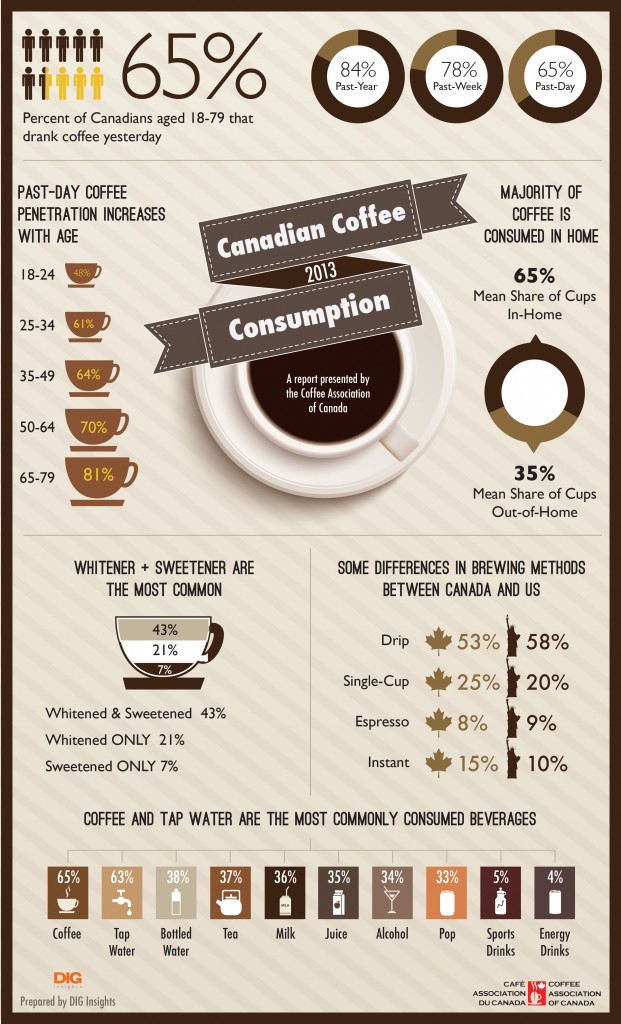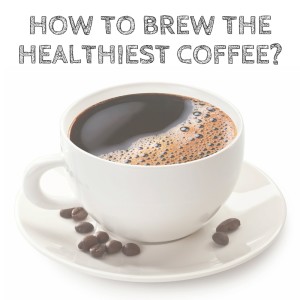Hi moms,
What is the first thing you put in your mouth in the morning? Let me guess – is it coffee?
How many times in a week do you stop by Tim Hortons or Starbucks to grab your favourite cup of coffee without even thinking about it? More than once? Don’t worry, you are not alone!
According to the Coffee Association of Canada more than 60% of Canadians between ages 25-49 drink coffee daily. 65% of coffee is consumed at home, and 35% is consumed out of home. In the infographic below you can clearly see that statistically coffee and tap water are the two most consumed beverages in Canada. In other words, coffee is so popular as a beverage that our consumption accounts for a third of our total consumption of free tap water. For a lot more people, especially those in desk jobs, coffee may command an even bigger share of their liquid intake.

Since so many people drink this every single day, I think it is time to do a thorough research around this topic and debunk all myths associated with coffee. As usual, my approach to health is very simple – I am pro simple, practical and realistic strategies that help to make our lives as mothers better and easier, without compromising on quality! When it comes to coffee, I was curious to know whether there is such a thing as “healthy coffee”, since so many moms drink it every single day and are unwilling to let it go. I’ve spent hours researching and reading online, and found tons of supporting data that are pro and con coffee, including a few really good coffee brands (there are actually few good quality coffees out there).
In the following article I am going to educate you about the health benefits along with the risks of coffee and will show you a few good brands of coffee you can substitute instead of the cheap coffee you are most likely drinking. I know how busy you are so stop feeling guilty about drinking coffee, just replace it with a better product!

Why is coffee such a commodity these days?
I personally don’t drink coffee, but was curious as to why people are so addicted to this beverage. Here’s what I found:
- Most people believe that the stimulating caffeine in the coffee will get them going for the day.
- Some people love the smell of coffee, and are attached to it both physically and emotionally.
- Other people like the way coffee is presented to the extent they treat it as a work of art! Whereas, traditionally, coffee was served hot and bitter it is now presented in many different flavours, blends, consistencies and colours – short black, long black, cappuccino, mocha, flat white, latte, and many, many more.
- Social aspect – a cup of coffee is also an excellent excuse to pause and relax for a moment in our busy day to catch up with friends and have a chat.
 Is Coffee Good For You?
Is Coffee Good For You?
In the nutrition bubble that I live in coffee doesn’t have a very good reputation. Most health gurus that I follow don’t drink coffee as they claim it is harmful to the body and in particular to the liver. This is a bit strange as I found lots of studies online that actually claim the opposite – coffee is actually good for the liver (1, 2, 3, 4)!
Looking even closer I found more evidence that coffee is actually good for you:
- Coffee can help reduce the risk of type II diabetes (1, 2, 3, 4)
- Coffee May Lower Your Risk of Alzheimer’s and Parkinson’s (1, 2, 3, 4, 5)
- Coffee may actually be very good for the liver – the last stage of liver damage cause by alcoholism and hepatitis is called liver Cirrhosis, where liver tissue is largely replaced by scar tissue. A few studies proved that coffee can reduce the damage of cirrhosis by 80%! The strongest effect for those who drank 4 or more cups per day (1, 2, 3). Coffee can also lower the risk of liver cancer by around 40% (5, 6).
- Coffee can help to prevent premature death
- Coffee is a a good source of antioxidants (1)
Before you get all hyped and go brew another coffee for yourself, I’d like to add that all the studies above are epidemiological in nature, meaning they can only show association, but they do not prove that coffee caused the effects! Nevertheless, there is a good evidence that, when consumed in moderation, coffee is not harmful and can even be beneficial to your body. Another important point to consider, all studies examined the effects of coffee without added sugar, therefore if you want to rip the benefits of coffee, don’t drink it with sugar, as sugar hampers the good effects of coffee and creates inflammatory response in the body.
Now, that we’ve covered all the science let’s talk about the actual coffee bean. Here’s what Asher Yaron, who is an avid coffee lover and focuses on the way coffee is processed nowadays, has to say about the studies above: “the studies that have been coming out recently about the health benefits of drinking coffee show, overwhelmingly, that coffee is a beverage that contains many health benefits. And, my question is what coffee are they studying? These studies are done with people who drink processed coffee, which, in my opinion, contains only a fraction of the health benefits that handpicked, fresh roasted, and freshly brewed coffee contains.”
Does coffee quality matter?
To this question my answer is a solid resounding YES!
Studies have shown that 91% of green coffee beans (green beans are unroasted beans) were contaminated with mould (aka mycotoxins). According to my research, the cheaper the coffee the more contaminated it will be and therefore will affect your gut microflora and would be detrimental to health. “The European Union has set relatively high standards for mycotoxin contamination in coffee, but in the U.S. standards are much more lax. In fact, many companies try to sell coffee to Europe first, then take the coffee that Europe rejects, turn around, and sell it to the U.S.”, says David Asprey a well known coffee researcher.

Coffee originates in South America and Africa, where climate is hot and damp, with processing plants often nearby. Mould thrives where its hot and damp and that is the reason why most green coffee beans are contaminated. Why is mouldy coffee not good for you? Studies have correlated mycotoxins with brain damage, weight gain, cancer, hypertension, kidney disease, and numerous other health problems.
Here are a few tips to help you avoid mouldy coffee beans:
- Buy single estate coffee beans – this means that all the beans are coming from one place (it should be clearly stated on the label)
- Don’t buy “blends” of coffee – they are usually a mix of cheap beans from multiple sources. Stick to one kind of bean and roast, without anything added to it.
- Avoid decaffeinated coffee – decaf coffee is basically processed coffee, meaning it was tampered with in order to change its original state, and as a result looses its medicinal properties.
- Look for Arabica beans, which are generally less moldy than Robusta beans (for both cheap and expensive coffees).
- Avoid natural processed beans. Although the phrase sounds nice, it means the beans are left outside and often collect debris and bird feces. Natural process is very common in Africa.
- Be wary of the wet process, which isn’t much better than the natural process. Beans are fermented in water to remove skins and become susceptible to toxins. Remember that mould thrives in water!
- Consider the environment in which your beans grow. Mold is less common at higher elevations, so the mountains of Central or South America are solid choices.
- Whether they’re monks, hippies, or locals, buy hand-picked coffee from experienced coffee harvesters who know how to pick only perfectly ripe beans for their peak effectiveness.
- Steam can help break down mycotoxins, making americanos a better choice than black coffee.
- Always brew your coffee with filtered water!
Source: https://www.bulletproofexec.com/the-benefits-of-coffee-your-brain-on-caffeine/
What is the healthiest way to brew your coffee?
I personally don’t drink coffee, but my husband loves coffee and he used to buy the cheapest and crappiest coffee he could find! I really wanted to find the best coffee for him as well as teach him to brew it in the best and healthiest manner so that he gets maximum benefit from what he’s putting into his body.
I’ve spent hours looking for the best ways to brew coffee and found a method which is called Bulletproof Coffee, here’s how we do it:
How to brew the healthiest coffee?
I want to hear from you!
Do you drink coffee regularly? How many cups per day do you drink, how often and what brand of coffee? Can you recommend a really good coffee brand you know of? I’d love to connect with you and answer any question or concerns you may have. Feel free to leave a comment below 🙂

I am not a regular coffee drinker, but I have tried Bulletproof coffee in the mornings and I love it 🙂 We buy organic/fairtrade coffee: ie Ethical Bean Coffee.
Coffee has a different effect on people whether they are a fast or slow metabolizer of caffeine. If you get the jitters, and are wired for up to nine hours after consumption, you are a slow metabolizer. If you get a boost in energy and alertness for a couple of hours; you are considered a “fast” metabolizer of caffeine. About half of us are “slow” and half of us are “fast”. If you are a slow metabolizer of caffeine and coffee, you might consider reducing your consumption; because coffee can do more harm than good. Slow caffeine metabolizers should not drink more than one cup of coffee a day.
Hi Erin, Yes you are right! My husband, for example is definitely a slow metabolizer when it comes to coffee, I am a fast metabolizer at it doesn’t really do anything to me…. I can go to bed right after drinking it. We’ve realised it through trial and error (of course), at some point he even had heart palpitations and weird hand twitches (scary…..). I agree with you that coffee should not be consumed more than once per day and should be treated as medicine or a drug, because that’s what it essentially is 🙂